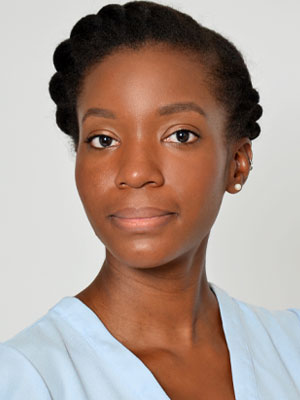Meet our new faculty: Misbath Daouda

- Discipline: Environmental Health Sciences
- Research interests: My work sits at the intersection of climate, health, and equity. I aim to understand how the health benefits of climate mitigation are distributed across groups, with a focus on energy transitions
- Hometown: Cotonou, Benin and Dakar, Senegal
- Current City: Oakland
- Hobbies: Horseback riding, hiking, salsa dancing, pottery
This January, Berkeley Public Health welcomes assistant professor of environmental health science Misbath Daouda. Dr. Daouda received her PhD in climate and health from Columbia University Mailman School of Public Health in 2023; her MPH from Harvard T.H. Chan School of Public Health in 2018; and a BS in chemistry and BA in Hispanic Studies from Washington College in 2015. We asked her about her work and hopes for the semester.
Berkeley Public Health: Where did you live and work before joining the UC Berkeley School of Public Health?
Misbath Daouda: Prior to joining the faculty at UC Berkeley School of Public Health, I lived in New York City while working towards my PhD at Columbia. After moving to the US for undergrad, I spent over a decade on the East Coast so making the decision to move to the West Coast wasn’t easy but I’m so glad I did.
What drew you to work and teach at UC Berkeley? Are there any researchers here who you really wanted to work with?
I came to UC Berkeley because it is a world-renowned institution that has historically been committed to creating positive and effective change in society. I wanted to be part of the groundbreaking work that students, staff, faculty, and everyone else at Berkeley work towards, especially when it comes to climate policy, environmental justice, and health equity.
What are you currently working on?
My current work focuses on the distribution of benefits from energy transitions in the context of climate change in the US and in West Africa. Using environmental epidemiology, exposure modeling, and qualitative methods, I aim to generate community-driven evidence that can support the centering of equity in energy policy and initiatives to achieve just transitions.
One example is a current project in collaboration with researchers at Lawrence Berkeley National Laboratory in which we are assessing the benefits of a gas-to-electric cooking intervention for asthmatic children living in the San Joaquin Valley. It’s also a tremendous opportunity to understand the potential health implications of energy insecurity in this context, with the goal of designing adequate interventions to scale up.
Another exciting project focuses on mapping out air pollution levels in a rapidly growing city in Ghana where the drivers of environmental injustice are not the same as they are in the US. To do so, we’ve deployed a network of low-cost air pollution sensors across the city and are engaging with community leaders to identify and operationalize potential indicators of social/environmental vulnerability.
What are your hopes going into the spring semester?
I’m really looking forward to getting to know my colleagues and meeting students both within the school and across the university. I’m also eager to connect with and learn from community-based organizations whose insight will help shape the future directions of my research.